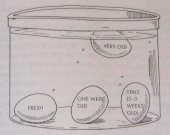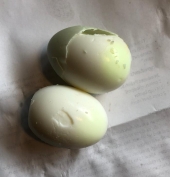
 2
2




“We can complain because rose bushes have thorns, or rejoice because thorn bushes have roses.” — Abraham Lincoln

 6
6




It is a privilege to live, work and play in the traditional territory of the Salish People.
Now drop and give me 52... ~ Come Join the permies Shoecamp! ~ All about Permies, including Tutorials ---
Twenty bucks off the homesteading bundle for the next 72 hours!
 5
5




"The rule of no realm is mine. But all worthy things that are in peril as the world now stands, these are my care. And for my part, I shall not wholly fail in my task if anything that passes through this night can still grow fairer or bear fruit and flower again in days to come. For I too am a steward. Did you not know?" Gandolf
 8
8






 7
7




 8
8




Use warm water, not cold water. Warm water can cause the contents of the egg to expand against the shell, helping to prevent bacteria to enter through the shell. No need to use harsh soap, bleach, or vinegar…warm water is sufficient.
Cold water can cause the contents of the egg to shrink, creating a vacuum that can pull bacteria into the egg through the porous shell.
It is recommended to not saturate or soak eggs in water. If they are that soiled, it may be best to just trash it.
"We're all just walking each other home." -Ram Dass
"Be a lamp, or a lifeboat, or a ladder."-Rumi
"It's all one song!" -Neil Young
 5
5





 4
4




Works at a residential alternative high school in the Himalayas SECMOL.org . "Back home" is Cape Cod, E Coast USA.
 3
3




Rebecca Norman wrote:Ooh, I'm glad that eggs here in India are always sold unwashed, so we can keep them out of the fridge for a month or two. Washed eggs are about as perishable as eggs that you've cracked into a bowl, aren't they?
 1
1




“We can complain because rose bushes have thorns, or rejoice because thorn bushes have roses.” — Abraham Lincoln
 2
2





"We're all just walking each other home." -Ram Dass
"Be a lamp, or a lifeboat, or a ladder."-Rumi
"It's all one song!" -Neil Young
 9
9




 5
5




"We're all just walking each other home." -Ram Dass
"Be a lamp, or a lifeboat, or a ladder."-Rumi
"It's all one song!" -Neil Young
 5
5




 2
2




Pat B.
 6
6




You Speak a Word. It is received by the other. But has it been received as it was Spoken?
 2
2








Patricia Boley wrote:There are laws in the state of Ohio about how you store eggs if you plan to sell them retail. Small egg handlers (less than 500 hens) are required to refrigerate at a temperature around 4 degrees F. I sell eggs at the farmer's market during the summer (no real requirements) and keep them in a cooler with ice packs, since they've already been refrigerated. Whatever I don't sell at the marker and during winter months I sell them retail at a local co-op. As far as cleanliness of eggs, the chicken eggs are usually pretty clean, unless it's been a rainy day. I spot clean with water. Duck eggs are usually filthy as they are indiscriminate as to where they lay. Again, a brief soaking in warm water and a scrubby pad occasionally.
 1
1




Jean-Paul Calderone wrote:
Patricia Boley wrote:There are laws in the state of Ohio about how you store eggs if you plan to sell them retail. Small egg handlers (less than 500 hens) are required to refrigerate at a temperature around 4 degrees F. I sell eggs at the farmer's market during the summer (no real requirements) and keep them in a cooler with ice packs, since they've already been refrigerated. Whatever I don't sell at the marker and during winter months I sell them retail at a local co-op. As far as cleanliness of eggs, the chicken eggs are usually pretty clean, unless it's been a rainy day. I spot clean with water. Duck eggs are usually filthy as they are indiscriminate as to where they lay. Again, a brief soaking in warm water and a scrubby pad occasionally.
Are you sure it was 4 degrees F? That sounds like freezing, not refrigerating. I've had eggs go solid in much warmer temperatures than that. Perhaps 4 degrees C?
Pat B.

 6
6




- Tim's Homestead Journal - Purchase a copy of Building a Better World in Your Backyard - Purchase 6 Decks of Permaculture Cards -
- Purchase 12x Decks of Permaculture Cards - Purchase a copy of the SKIP Book - Purchase 12x copies of Building a Better World in your Backyard
 7
7




Timothy Norton wrote:Highlighting some things that folks have said previously, unwashed eggs are pretty convenient but every once in a while you might need to clean some shells up!
I have found that egg laying box hygiene is important to keeping eggs clean. When we get storms, there might be some mud so there still needs to be some cleanup. If a dry cloth doesn't work, I move onto washing when I am getting close to utilizing the eggs.
I setup my sink into an assembly line. If it is a big batch, the first sink is stoppered and filled with eggs which will be submerged in water. They get processed one by one to check for cracks while I take a soft wet cloth to wipe off any gunk. These go into the second sink which get a post cleaning rinse before they are wiped clean with a new dry cloth. I then package them in egg crates and they are then stored in a refrigerator.




$10.00 is a donation. $1,000 is an investment, $1,000,000 is a purchase.
 3
3




Skandi Rogers wrote:I don't wash eggs, they are normally clean but even if they have a bit of blood or a smear of something on them it's left, if one's been laid somewhere dumb like right under the roosts then I call it a dog egg and it still doesn't get washed!
 1
1




John F Dean wrote:Hi Amy,
Welcome to Permies.
 2
2




property in Tas, Australia. Sandy / river silt soil.low ph. No nutrients due to leaching. Grazing country. Own water source. Zone 9b.
 1
1








Anthony Powell wrote:I've been taught not o shift eggs between fridge and kitchen. Cold eggs from the fridge will collect condensation, so get them back in the fridge asap.
They seem to last for months in the fridge, slowly losing water, so they will float but be edible. I've learnt though that they lose vitamins over time. Apparently they lose vitamins faster in the fridge - but will they store for months at room temperature? I doubt.
$10.00 is a donation. $1,000 is an investment, $1,000,000 is a purchase.
 2
2










 1
1




"Also, just as you want men to do to you, do the same way to them" (Luke 6:31)
 2
2




Inge Leonora-den Ouden wrote:Here in the Netherlands people who sell eggs from their own chickens do not have to clean the eggs. Probably also other sellers don't, but I don't know. I buy my eggs right from the small-scale organic farm, where the chickens are walking outside (but mostly lay their eggs inside, in the nesting boxes, so I'm told).
I can not keep chickens here. Not enough space to let them walk freely, and probably some neighbours would complain about the noise ...
$10.00 is a donation. $1,000 is an investment, $1,000,000 is a purchase.
 3
3




Real funny, Scotty, now beam down my clothes!

|
We're all out of roofs. But we still have tiny ads:
Learn Permaculture through a little hard work
https://wheaton-labs.com/bootcamp
|



